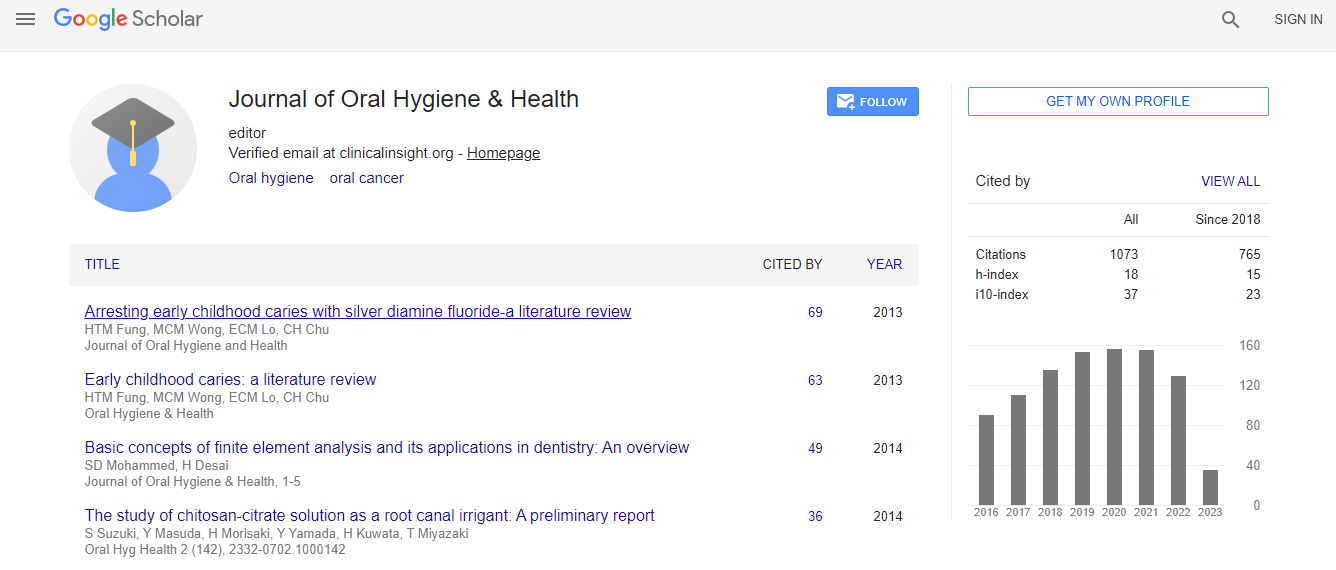Our Group organises 3000+ Global Conferenceseries Events every year across USA, Europe & Asia with support from 1000 more scientific Societies and Publishes 700+ Open Access Journals which contains over 50000 eminent personalities, reputed scientists as editorial board members.
Open Access Journals gaining more Readers and Citations
700 Journals and 15,000,000 Readers Each Journal is getting 25,000+ Readers
Google Scholar citation report
Citations : 1073
Journal of Oral Hygiene & Health received 1073 citations as per Google Scholar report
Journal of Oral Hygiene & Health peer review process verified at publons
Indexed In
- Index Copernicus
- Google Scholar
- Open J Gate
- JournalTOCs
- RefSeek
- Hamdard University
- EBSCO A-Z
- OCLC- WorldCat
- Publons
- Geneva Foundation for Medical Education and Research
- Euro Pub
- ICMJE
Useful Links
Recommended Journals
Related Subjects
Share This Page
Protocol for the association of depression and dental caries: NHANES 2011-12
13th International Conference and Exhibition on Dental Medicine
R Constance Wiener, Usha Sambamoorthi and Chan Shen
West Virginia University, USA University of Texas, USA
Posters & Accepted Abstracts: J Oral Hyg Health
Abstract
Purpose: Depression is a common mental health condition in which negligent self care is often a feature. The association of depression and poor oral health has limited research. The purpose of this study is to determine if there is an association of depression with untreated dental caries among adults� ages 18-55 years. Methods: The data for this study were from the 2011-12 National Health Nutrition and Examination Survey. The key outcome was the presence/absence of untreated dental caries. The key independent factor was depression, based on the responses to the Patient Health Questionnaire-9 Depression Score. There were 2,892 participants. Chi square and logistic regressions were conducted. Results: There were 2,169 participants (76.7%) without depression, 454 (14.6%) who with mild depression, and 270 (8.7%) who with moderate/severe depression. There were 710 (21.3%) with current caries. In unadjusted analyses, individuals with mild depression had an odds ratio of 1.44 (95% CI: 1.07, 1.93) of having current caries. The unadjusted odds ratio increased to 1.74 (95% CI: 1.19, 2.55) for individuals with moderate or severe depression. In an adjusted model, the odds ratios remained positive, but they were no longer significant (1.23 [95%CI: 0.96, 1.58] for mild and 1.30[95%CI: 0.84, 2.01] for moderate/severe depression. Conclusions: Lower family income to poverty ratio, education and lack of insurance were stronger predictors of untreated dental caries than depression in adults� ages 18-55 years.Biography
R Constance Wiener has completed her PhD in Public Health in 2012 from West Virginia University and completed her DMD at the University of Pittsburgh. She is a WVU Clinical and Translational Science Institute Clinician Scientist. She has published more than 30 papers in peer-reviewed journals and has been served as an Editorial Board Member and journal Reviewer.
Email: rwiener2@hsc.wvu.edu

 Spanish
Spanish  Chinese
Chinese  Russian
Russian  German
German  French
French  Japanese
Japanese  Portuguese
Portuguese  Hindi
Hindi 
